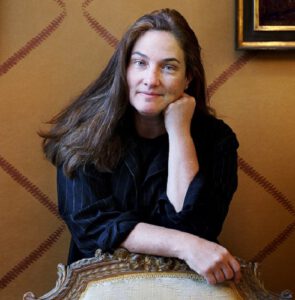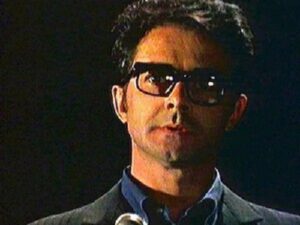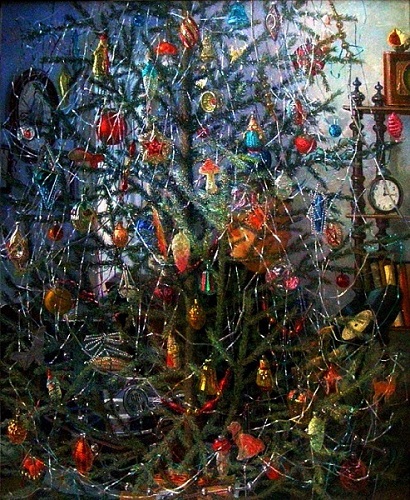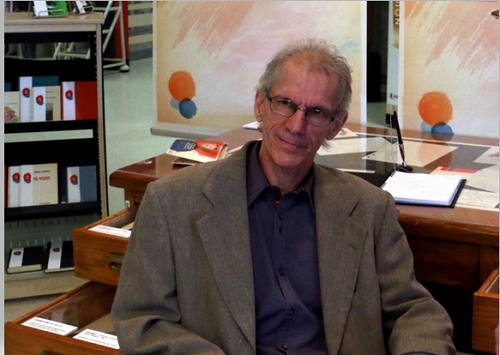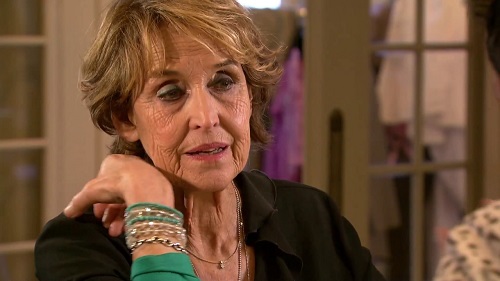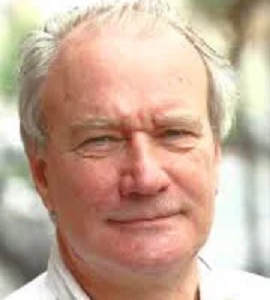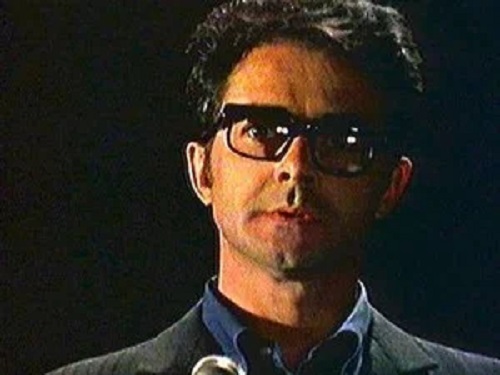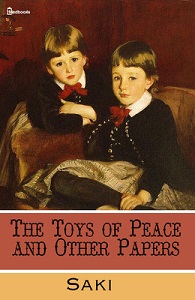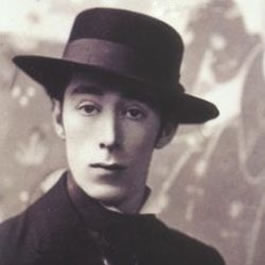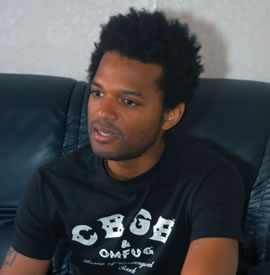De Amerikaanse schrijver Miles Marshall Lewis werd geboren op 18 december 1970 in The Bronx, New York. Zie ook mijn blog van 18 december 2006 en ook mijn blog van 18 december 2007.
Uit: Peg Entwistle Will Have Her Revenge on Hollywoodland
„Her countenance remained stoic with authoritative undertones, unaffected by the man’s change in attitude. With a phone call she was given a triangular visitors sticker for her jacket and directed to walk through the metal detector entranceway. “Good luck,” offered the guard as she marched onto the elevator. She pressed the button for the forty-third floor. As the lift ascended she reached up for her shades and placed them in an inside pocket. Stepping off the elevator, Rogess was immediately greeted by a chipper, casually dressed brunette volunteering a firm handshake.
“Rogess, I’m Kelli! Good to meet you. Christmas will be with you shortly. Cold out there, isn’t it? Please, have a seat in reception. He’s meeting with Punch, he’ll be out in a minute.”
Rogess sat, adjusted her dark-as-black navy stockings, and recalled her father’s advice: Be yourself. With sarcasm, she thought: Yeah, that’ll get me the job. Smirking, she thought: So this is it. How anticlimactic. No sooner than she contemplated browsing magazines had a tone sounded from the phone on Kelli’s desk.
“Christmas is ready for you, Rogess. I’ll take you back to the office. I’d advise you keep your coat with you,” said Kelli, with a wink. Rogess was led into Christmas’s large, sunlit corner office; Kelli smiled (had never stopped smiling, actually) and shut the door behind her.
Christmas Muse leaned against his desk, almost sitting. His expressive brown eyes were wide with wonder and zealous spirit, assessing Rogess and drawing her in immediately. His hair was slightly longer on top than Rogess’s buzz cut, bald at the sides. He had a boyish look about him, despite the neat mustache topping off his upper lip. The busy design of his Glen plaid suit somehow lent levity to the aristocratic air about him, yet he still held the commanding presence of a man of ability, an American pioneer, twice his age. He was thirty-three.“
Miles Marshall Lewis (New York, 18 december 1970)
De Franse schrijfster Mazarine Pingeot werd geboren in Avignon op 18 december 1974. Ze is het buitenechtelijk kind van François Mitterrand, wat voor het grote publiek verborgen bleef tot in 1994. Pingeot bezocht het elitaire lycée Henri-IV in Parijs en studeerde daarna filosofie aan de École Normale Supérieure Lettres et Sciences Humaines. In 1998 publiceerde zij haar eerste roman Premier Roman, die niet zo best ontvangen werd door de kritiek. Dat gold wel voor haar tweede boek Zeyn ou la Reconquête uit 2000. In 2005 verscheen Bouche cousue over haar jeugd als staatsgeheim. Le Cimetière des poupées uit 2007 vertelt de geschiedenis van een moeder die haar eigen kind doodt. Mazarine Pingeot woont tegenwoordig in Parijs samen met haar partner Mohammed Ulad Mohan, hun zoon Ascot en hun dochter Tara
.
Uit: Le Cimetière des poupées
J’avais mis des bottes, j’étais sûre d’avoir du succès, elles étaient si chères. Je ne t’ai pas parlé de la dépense, tu m’aurais fait des reproches, c’est sûr. Mais je pensais que, vu le prix, on les remarquerait. Il y avait une femme, avec un chapeau, un chapeau, comment dire, ni rond ni carré, un chapeau de détective, le même, presque le même que ma mère gardait en souvenir de mon père.
C’est tout ce qu’il lui a laissé, j’aurais pu dire nous n’est-ce pas, mais le nous que nous formions, ma mère et moi, n’était que de circonstance. Dire qu’il lui a laissé est aussi excessif, il l’a abandonné, dans une pièce quelconque, il l’a oublié là, avant de claquer la porte une bonne fois pour toutes, devant ce ventre infâme que je déformais. Elle l’aurait voulu vide, ce ventre, et plein ce chapeau.
Tout le monde n’avait d’yeux que pour elle, parce qu’elle était belle je crois, mais je ne pouvais m’empêcher de penser que c’était à cause du chapeau. Alors mes bottes, bien sûr. D’une certaine manière, ça aurait pu me rassurer, tu ne les as pas remarquées toi non plus, ces bottes hors de prix, peut-être les aurais-tu trouvées jolies, sans poser de questions, parce que après tout elles ressemblent à des bottes, celles que je portais il y a dix ans déjà, depuis c’est revenu à la mode, mais est-ce que tu te soucies des modes, est-ce que tu te soucies de la manière dont je m’habille, est-ce que tu regardes jamais mes pieds ? Son chapeau, oui, parce qu’elle l’a sur la tête et que, quoi qu’on en dise, c’est toujours le visage qu’on regarde en premier.
J’avais encore raté mon entrée dans cette salle, mais comment deviner que ce serait notre dernière soirée ?
Tu te tenais à mes côtés, et je les observais, toutes ces femmes, femelles, artistes, présidentes de société ou assistantes, des élégantes. Tu n’aimais pas l’élégance, le luxe, l’ostentation, et j’avais réussi à me rendre invisible, comme tu trouvais qu’il seyait à une femme. Pourtant j’avais remarqué que tu les regardais, ces femmes habillées avec soin, que tu leur souriais et même que tu leur plaisais. J’aimais que tu les approches, les séduises, combien tu étais brillant alors, combien j’étais fière de toi, de tes mots, de ton esprit, de cet humour que tu déployais, toi qui n’avais pas tant l’occasion de faire rire, parce que je suis sérieuse, trop sérieuse, et si j’ai pensé un moment que cela te convenait, je soupçonnais aussi que tu m’aurais peut-être préférée éblouissante. A` défaut, tu te délectais de leur compagnie, à ces femmes du monde, et je n’en prenais pas ombrage, j’aurais fait comme toi à ta place, je les trouvais intéressantes moi aussi, je les admirais, et je t’admirais de te faire admirer d’elles.“

Mazarine Pingeot (Avignon, 18 december 1974)
De Britse toneelschrijver Christopher Fry, pseudoniem van Christopher Harris, werd geboren in Bristol op 18 december 1907. Zie ook mijn blog van 18 december 2006.
A sleep of prisoners
The human heart can go the lengths of God.
Dark and cold we may be, but this
Is no winter now. The frozen misery
Of centuries breaks, cracks, begins to move;
The thunder is the thunder of the floes,
The thaw, the flood, the upstart Spring.
Thank God our time is now when wrong
Comes up to face us till we take
The longest stride of soul men ever took.
Affairs are now soul size.
The enterprise
Is exploration into God.
Where are you making for? It takes
So many thousand years to wake,
But will you wake for pity’s sake!
Christopher Fry (18 december 1907 – 30 juni 2005)
De Canadese dichter en schrijver Gatien Lapointe werd geboren op 18 december 1931 in Québec, waar hij ook het klein seminarie bezocht. Daarna studeerde hij o.a literatuur aan de universiteit van Montréal. In 1953 verscheen zijn eerste dichtbundel Jour Malaisé. In 1956 kon hij met een beurs aan de Sorbonne en aan het Collège de France in Parijs gaan studeren. Na zijn terugkeer naar Canada in 1962 werkte hij jarenlang als docent.
Dieu ou l’homme
J’épelle dans ma main le nom de chaque chose
Je dessine la première cité
L’odeur de la terre remplit ma face
La terre est en moi comme un arbre
Plein de passion et plein de nuit
Je vous rencontrerai à l’appel des mouettes
La mer soudain se lève sur sa hanche bleue
Et l’horizon retentit de nouvelles
Chaque événement me ramène au monde
Je reconnais les armes du bonheur
Haut navire amarré à mon épaule
C’est aujourd’hui l’enfance du soleil
Et la continuité de la chair dans la mort
Je ne supprime rien de l’espace de l’homme
Ma main sauve chaque espérance
Je nommerai la terre très fidèle
Amour ô rives de toutes faiblesses
Je fête la présence nécessaire
Un éclair garantit mon rêve dans l’orage
J’ai pris de la terre dans mes deux mains
J’ai bouché mes yeux avec de la terre
J’ai mis de la salive sur mes plaies
Je m’éveille en nommant tout ce que j’aime
Matin maladroit sur les doigts de l’homme
Je t
iens ma face à la hauteur des arbres
J’apprends la patience de la rivière
Le récit des morts rapproche nos têtes
Ô mer cette grande hirondelle bleue
Naviguant sur les lignes de ma main
C’est ici que je vous reconnaîtrai
D’un pas j’éveillerai la mémoire du feu
D’un mot j’élèverai les figures du temps
Ma main en visière sur la montagne
J’apporte l’ombre et la lumière
J’apporte la chaleur d’un visage qui naît
Ce jour gardera-t-il mon nom toute l’année ?
Gatien Lapointe (18 décember 1931 – 15 september 1983)
De Birmees – Britse schrijver Saki (pseudoniem van Hector Hugh Munro, een naam gekozen uit de Rubaiyat van Omar Khayyam) werd geboren op 18 december 1870 Akyab, Birma als de zoon van Charles Augustus Munro, een inspecteur-generaal voor de Birmese politie in de tijd dat het land nog door Groot-Brittannië werd geregeerd. Hij groeide op in Engeland, en werd samen met zijn broer en zus door zijn grootmoeder en tantes opgevoed in een strak huishouden. Munro werd opgeleid aan Pencarwick School in Exmoth en de Bedford Grammar School. In 1893 ging hij bij de Birmese politie, maar werd drie jaar later om gezondheidsredenen gedwongen terug te gaan naar Engeland. Daar begon hij aan een carrière als journalist, en schreef voor kranten zoals de Westminster Gazette, Daily Express, en Morning Post. In 1900 verscheen Munro’s eerste boek, The Rise of the Russian Empire, een historische studie gebaseerd op Edward Gibbons boek The Decline and Fall of the Roman Empire. Dit boek werd in 1902 gevolgd door Not-So-Stories, een bundel korte verhalen. In 1914 verscheen het boek When William came, waarin hij beschrijft wat er zou kunnen gebeuren als de Duitse keizer Engeland zou innemen. Hij wordt gezien als de meester van het korte verhaal en wordt vaak vergeleken met O. Henry en Dorothy Parker.
Uit: The toys of peace
“Harvey,” said Eleanor Bope, handing her brother a cutting from a London morning paper of the 19th of March, “just read this about children’s toys, please; it exactly carries out some of our ideas about influence and upbringing.”
“In the view of the National Peace Council,” ran the extract, “there are grave objections to presenting our boys with regiments of fighting men, batteries of guns, and squadrons of ‘Dreadnoughts.’ Boys, the Council admits, naturally love fighting and all the panoply of war . . . but that is no reason for encouraging, and perhaps giving permanent form to, their primitive instincts. At the Children’s Welfare Exhibition, which opens at Olympia in three weeks’ time, the Peace Council will make an alternative suggestion to parents in the shape of an exhibition of ‘peace toys.’ In front of a specially-painted representation of the Peace Palace at The Hague will be grouped, not miniature soldiers but miniature civilians, not guns but ploughs and the tools of industry . . . It is hoped that manufacturers may take a hint from the exhibit, which will bear fruit in the toy shops.”
“The idea is certainly an interesting and very well-meaning one,” said Harvey; “whether it would succeed well in practice—”
“We must try,” interrupted his sister; “you are coming down to us at Easter, and you always bring the boys some toys, so that will be an excellent opportunity for you to inaugurate the new experiment. Go about in the shops and buy any little toys and models that have special bearing on civilian life in its more peaceful aspects. Of course you must explain the toys to the children and interest them in the new idea. I regret to say that the ‘Siege of Adrianople’ toy, that their Aunt Susan sent them, didn’t need any explanation; they knew all the uniforms and flags, and even the names of the respective commanders, and when I heard them one day using what seemed to be the most objectionable language they said it was Bulgarian words of command; of course it may have been, but at any rate I took the toy away from them. Now I shall expect your Easter gifts to give quite a new impulse and direction to the children’s minds; Eric is not eleven yet, and Bertie is only nine-and-a-half, so they are really at a most impressionable age.”

Saki (18 december 1870 – 14 november 1916)
De Zweedse schrijver Viktor Rydberg werd geboren op 18 december 1828 in Jönköping, Zweden. Zie ook mijn blog van 18 december 2006.
Uit: Teutonic Mythology
“From the Longobardians I now pass to the great Teutonic group of peoples comprised in the term the Saxons. Their historian, Widukind, who wrote his chronicle in the tenth century, begins by telling what he has learned about the origin of the Saxons. Here, he says, different opinions are opposed to each other. According to one opinion held by those who knew the Greeks and Romans, the Saxons are descended from the remnants of Alexander the Great’s Macedonian army; according to the other, which is based on native traditions, the Saxons are descended from Danes and Northmen. Widukind so far takes his position between these opinions that he considers it certain that the Saxons had come in ships to the country they inhabited on the lower Elbe and the North Sea, and that they landed in Hadolaun, that is to say, in the district Hadeln, near the mouth of the Elbe, which, we may say in passing, still is distinguished for its remarkably vigorous population, consisting of peasants whose ancestors throughout the middle ages preserved the communal liberty in successful conflict with the feudal nobility. Widukind’s statement that the Saxons crossed the sea to Hadeln is found in an older Saxon chronicle, written about 860, with the addition that the leader of the Saxons in their emigration was a chief by name Hadugoto”.

Viktor Rydberg (18 december 1828 – 21 september 1895)
